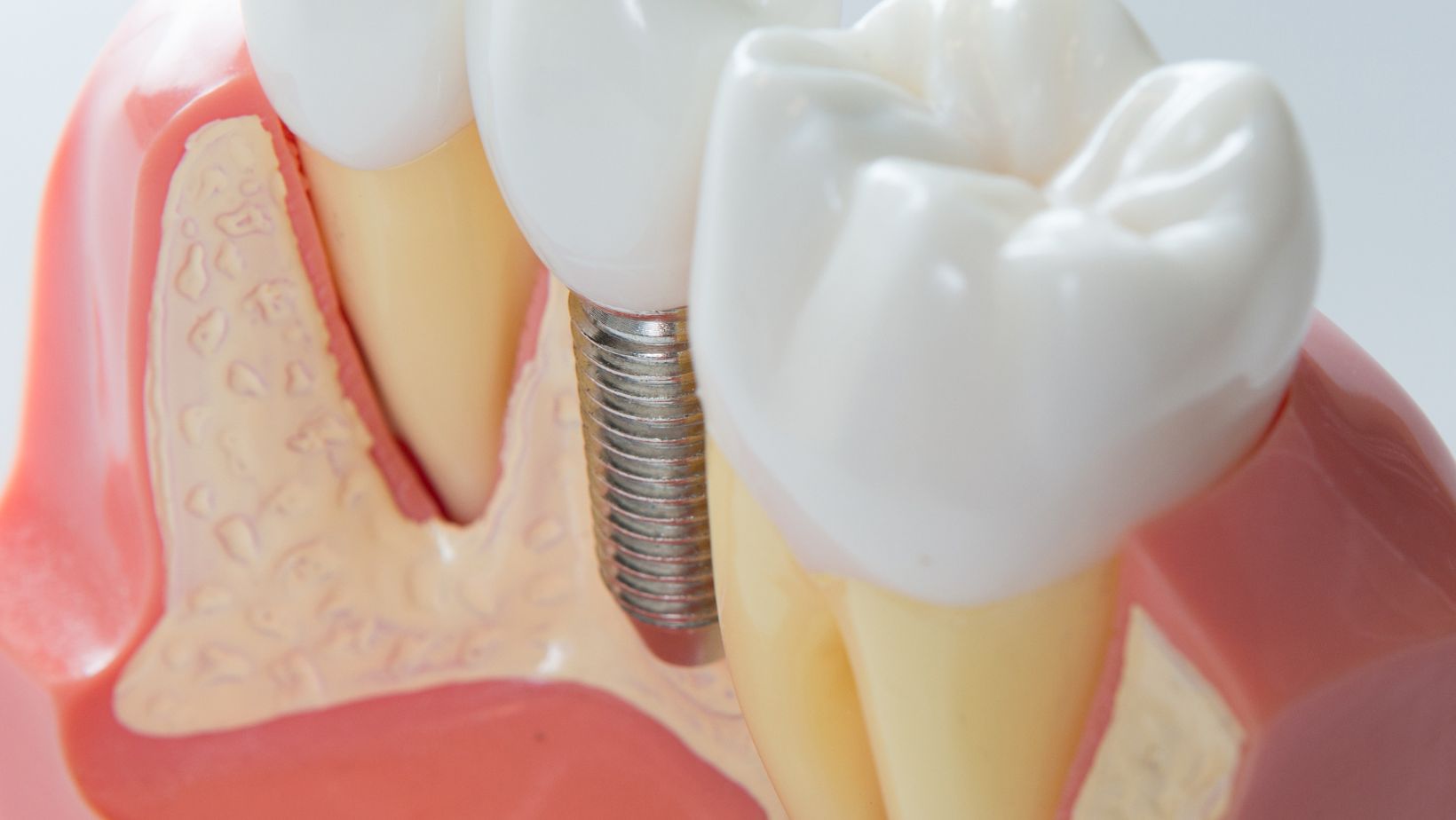A dental implant is often a great solution for a missing or damaged tooth. Many patients prefer them to old-fashioned dentures or bridgework. Implants consist of a metal post that is embedded directly into the jaw bone, topped with an artificial crown that looks and feels like the original tooth. Drilling a hole into your jaw to implant a piece of metal sounds intense, right? It might have you wondering “Are dental implants safe?”
Implant surgery has become a routine procedure and has a 97% success rate. Like any surgery, though, there are some risks. Implants are safe, but it helps to know how the procedure works as well as the common side effects and potential issues when deciding if they are right for you.
The Dental Implant Procedure
After a thorough dental exam, x-rays, and impressions, you and your dentist decide on a treatment plan together. The overall procedure is based on various conditions, including the number of teeth involved and the stability of the jaw bone.
The procedure consists of five basic steps:
- If the tooth is damaged instead of missing, it is first extracted.
- The oral surgeon preps the jawbone. If the bone is too small or weak, this could include bone grafting, along with sufficient time to heal before the dentist can proceed. More about that later.
- The surgeon drills into the bone, placing a titanium implant post into the hole.
- A small piece of metal called an abutment is attached to the top of the post. This provides a platform for the artificial tooth.
- After a week or two of healing, the artificial tooth is ready and the surgeon attaches it to the abutment. It may be permanently cemented in or removable.
The procedure is performed in stages as outpatient surgery, with time to heal between stages. The bones actually grow around and attach to the implant, which can take a while. Time from start to finish can range from days to months.
Immediate Concerns
After dental implant surgery, it’s common to have some minor pain and discomfort in the affected area. Some patients experience swelling, slight facial bruising and a bit of bleeding. These symptoms are similar to other oral procedures, like a root canal procedure or a tooth extraction. They’re generally nothing to worry about and will go away after a day or two. Over-the-counter pain medications and sticking to soft foods for a while are usually all that’s needed.
Possible Implant Complications
While implant surgery is routine, there is a risk for complications in a small percentage of patients. Our goal is not to scare you, but to inform you of all the risks, no matter how rare. Luckily, most of these problems are avoided or at least greatly reduced with an experienced dental professional. A surgeon who has performed many implant surgeries will become adept at the more delicate parts of the procedure. Here are the more serious things to watch out for:
Infection
Surgeries of any kind come with a risk of infection. When getting a dental implant, the surrounding tissue can become infected. Patients are often given antibiotics both before and immediately after the procedure to help reduce the risk.
Getting an infection might delay the completion of an implant because you’ll have to wait until it clears up. In rare cases, untreated infections may lead to serious medical issues. An abscess can form, or the infection can spread into the surrounding bone and the rest of the body.
Insufficient Bone
When the jawbone is too weak or thin to support the implant post, the procedure can fail. This is usually discovered while reviewing x-rays, so it can be fixed before the surgery. First, the jaw is built up using bone grafting. A surgeon takes a piece of bone from another part of the body or a manmade bone-like material and attaches it to the jawbone. The patient can proceed with the implant once the graft has healed and fused to the rest of the jaw.
When the implant procedure works properly, the implant essentially becomes part of the jaw. Sometimes, the bone just won’t grow, causing the implant post to become unstable. There is a chance of this happening even when a bone graft isn’t necessary. In these cases, the surgeon has no option other than to remove the implant and try again. There is a link between smoking tobacco products and this situation.
Injury to the Surrounding Area
While drilling the hole for the implant post, it’s possible for the surgeon to accidentally damage the surrounding area. They can hit a nearby tooth or nick a blood vessel.
Nerve damage is rare, but it can happen. It’s more problematic than a simple nick, causing temporary or permanent numbness, tingling, or pain in teeth, gums, lips, or the face. Another very serious complication is perforation of the sinus cavity when drilling into the upper jaw. This can cause sinus problems and recurrent sinus infections in the future. Luckily, these injuries are not very common.

Breaking an Abutment
Patients need to wait to get their crown after an abutment is placed. The area needs to heal and the bone needs to grow around the implant. Sometimes, a temporary crown will be put on top, but it won’t fit as well or be as strong as the final crown.
It would take something extreme, but there is a chance that enough force can bend or break the abutment, whether it’s covered with a temporary crown or left exposed. Normal chewing probably wouldn’t do it, but chomping down on something hard or being hit in the mouth or other blunt trauma could.
Breaking an abutment isn’t so much a matter of safety as it is a matter of inconvenience. A bent or broken abutment needs to be replaced before the permanent crown is attached. If the post beneath it is damaged, it will need to be switched too.
Allergic Reactions
It’s rare, but some people are allergic to the titanium used in dental implants. There are tests that can be done before surgery to make sure a patient doesn’t have the allergy.
If a patient gets a rash or swelling on their face, or excessive swelling of the soft tissues inside the mouth, it might be a sign that they’re allergic to titanium. Allergic reactions could impact the healing period for the implant wound. The implant may also start to loosen—an indication that the bone isn’t fusing properly. Severe reactions include muscle and joint soreness and even neurological problems.
A titanium allergy doesn’t mean you can’t get dental implants, it just means you need to use a different metal. Dentists often suggest zirconia as an alternative.
Tissue Issues
Dental implant patients can develop some problems with their gum tissue. Gingival recession, also called receding gums, may happen at the implant site. This isn’t healthy for the gums, plus, it can expose the metal abutment if they recede far enough.
Tissue necrosis happens when part of the gum tissue around the implant site dies. Again, this is something to watch for.
Regular follow up care after an implant, along with good dental hygiene helps to reduce these risks.
Who is Most At-Risk?
Dental implants are safe. The risks involved are generally more about the dental implant procedure not being successful than any true danger. The following conditions should be discussed with your dental implant surgeon. They could indicate you aren’t a good candidate for the surgery:
- Diminished jawbone strength
- Untreated cavities
- Active periodontal disease
- Uncontrolled diabetes
Should You Get a Dental Implant?
Whenever you’re getting any kind of dental procedure or surgery, it’s smart to weigh the pros and cons. Dental implants are safe, and when there are problems, they are usually minimal and manageable. About 500,000 patients in the U.S. get implants each year, and the majority have successful outcomes. People love that there is an alternative to old-fashioned dentures that can renew their smile.
There are things you can do to improve your overall outcomes. First, consult with a dentist to decide if implants are right for you. If you’re a smoker, consider quitting. Not only can it improve your health but it can also help the chances of a successful implant.
After the surgery, follow the dentist’s instructions about follow-up care and prescription medications. As always, practice good oral hygiene and see the dentist for regular checkups—and enjoy your new smile!


